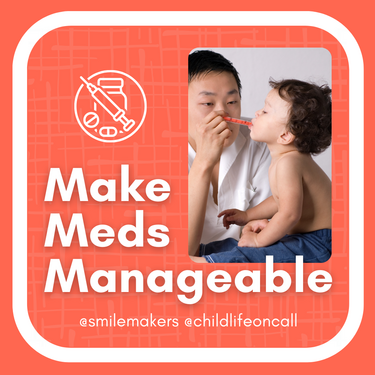
This blog was originally posted for SmileMakers Inc and author was compensated for this post. All opinions are my own.
Taking medications can be one of the most anxiety-provoking experiences for children and families in the hospital. Here are a few scenarios for you:
See where I’m going here? One of the first things I do when I meet a family in the hospital as a child life specialist, in addition to making a psychosocial assessment, is to start to understand what their past medical history is, including how they take medicine. Knowing this information at the beginning of a relationship makes it much easier to speak on behalf of the family to the rest of the care team and allows me to build on what already works for this specific family. It also allows you to get a baseline idea of how they do with medications prior to a long stay at the hospital.
One way to introduce the topic of taking medications without being intrusive or persuasive is to introduce items that are within the realm of medication, but do not provoke feelings of negative anticipation. See where I’m going here? You guessed it… PLAY.
Let’s take each scenario before and discuss how I would begin to understand the child’s experience with medication:
Case 1. Look to the parent to get your information and how they do with medicine. Find out how they give medication: cup, syringe, hidden in food, chewable gummies, etc. Introduce non-threatening play by using the child’s previous experience with medications and reinforcing positive behavior. Give a stuffed animal or medical play doll medication and then reward the child by giving a sticker. This way, when medication compliance is necessary in the hospital, the child and family have an awareness of what they can implement.
Case 2. Get to know your patient by offering something that may get the conversation going. I like to use these sloth and pill backpack pulls because they are a great conversation starter about school, medication and how silly they are. By building on a non-threatening conversation, you’re opening up the door to bring the topic back up should they need to know how to swallow pills before being discharged.
Case 3. Get to know your patient’s other sensory needs by asking the patient and parents how other behaviors they have. What other textures work well and don’t work well? How do they handle a situation like this at home? Build on what already works for this patient and get creative with offering something that they do like the taste of before and after the medication: popsicles, apple sauce, cherry syrup… whatever it takes! As you're getting to know your patient, offering this pill putty is a great way to give them something to hold and manipulate while you have this conversation.
